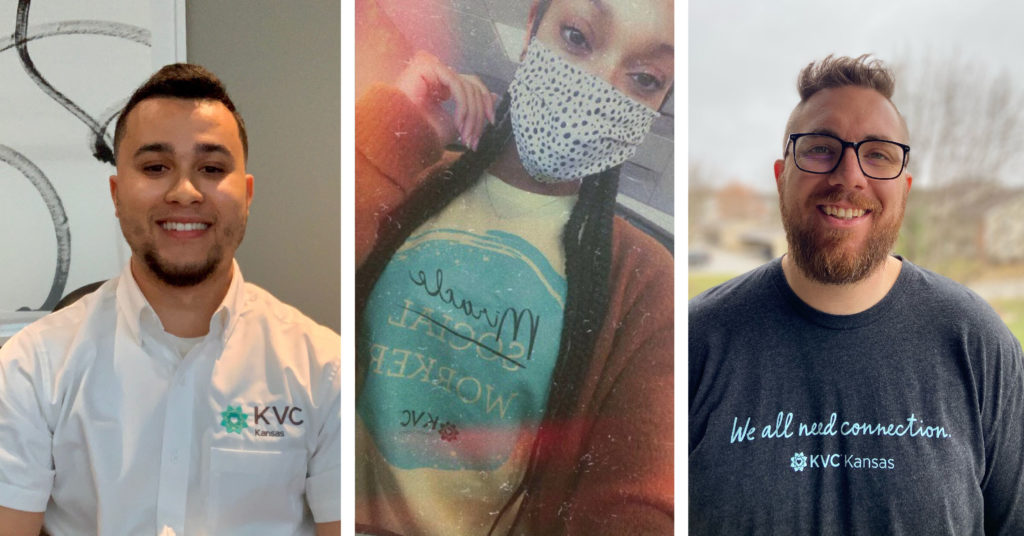A Day in the Life of a Social Worker

March is National Social Work Month and KVC is honoring the incredible ways that social workers, clinicians, and other professionals improve the lives of children, adults and families. They bring compassion, knowledge, and care to their work and this makes a powerful positive impact in our communities every single day. We celebrate that impact and want to share a peek into a day in the life of a social worker.
KVC case managers Victoria Clark, Dalton Shump, and Micah McEwan all work for the Olathe, Kansas office, where they coordinate and support the day-to-day needs of children and teens in foster care and their families. At any given time, these hard-working case managers are working with up to 20 children or families. We interviewed them to learn more about what it’s like to serve in these important roles with KVC.

Dalton Shump, Victoria Clark and Micah McEwan
How did you come to be a social worker?
There are many different paths that lead people to this work. Victoria, Dalton, and Micah were each inspired to be social workers from a deep desire to help children.
“I’ve always known I wanted to work with kids and families,” Micah said. “I struggled to know what exactly that looked like for a long time. I had a friend encourage me to apply to KVC, to explore if social work in the child welfare system would be a good fit. It has been such a good fit for me.”
Victoria’s response was similar. She found a job listing from KVC in her search for a career in child welfare after graduating from college. For Dalton, it was more personal.
“[I] came to do this job simply to try and help people and kids. I was adopted myself and have my own personal background with the foster care system. I think that has always made me want to pay it forward and help people as well, especially the youth.”
-Dalton Shump
What is the first thing you do every day?
Every KVC case manager replied with the same answer: catch up on texts, calls, voicemails, and emails from clients.
Micah said, “I am primarily scanning to make sure that there were no emergencies overnight.”
All of them reiterated that the first step to any day as a case manager is to go through the many messages they have received from the families and kids they serve. Victoria mentioned that constant communication is a large part of her workday, from beginning to end.
What does a daily routine look like?
Each day involves communication and coordination with families and kids. When they aren’t fielding messages, the case managers all discussed the variety that each day brings.
“A typical day for me usually looks like having a few worker-child meetings. These are where we case managers visit our youth clients in their respective foster homes or relative homes monthly to see how they are doing and get any new updates,” Dalton said. “After those, I usually have at least one visit between a parent and child that I supervise in the afternoons or evenings. Depending on the time of the month I might have a court hearing to attend in between those visits or a case plan meeting to hold. The rest of the time is trying to communicate with clients and schedule next month’s meetings or handle daily crises.”
Micah’s response echoed Dalton’s, sharing that between scheduled appointments is an ever-present list of administrative tasks to make sure everything is scheduled and logged appropriately.
“Throughout the day there could be numerous types of appointments,” Micah said. “Court hearings, holding case plans, meetings with parents, meetings with foster parents and children, staffing cases, transporting children, supervising visits between kids and parents, and so many others. In between those scheduled items I make sure court reports are submitted to the court on time, log interactions with clients, make referrals, and in general work on a never-ending list of to-dos. In between all of that though is answering phone calls and texts.”
No matter what’s going on, all three case managers are prepared to work late or work through lunch.
“Depending on how busy I am, I may have to work through lunch, so I often pack snacks in my purse for busy days,” Victoria said.
They’re also ready to take on the most pressing need or most urgent order of business.
“A daily routine is honestly very hard to say… I would say I always start with making sure there are no crises needing immediate attention,” Micah said. “One of the most difficult aspects of this daily work is that there is an ever-growing list of things needing to be done. All of which are important.”
“When you feel like you are making good headway and in a good spot with your workload, something always comes up. We’re always on our toes, ready to respond with compassion and support.”
-Micah McEwan
What is your favorite thing you get to do most days?
At KVC, we know that we all need connection, and each of these case managers chose some type of client interaction as their favorite part of the workday. Connecting with the children and families they serve and providing them with the opportunities, skills, and resources they need to thrive keeps these social workers motivated and engaged in their work.
“I enjoy parent-child visits since they are so important to the clients,” Victoria said. “They look forward to them each week.”
“Interacting with the kids whenever I can and trying to strengthen my relationship with them,” Dalton said.
For Micah, his favorite part of the day includes any way he can care for one of the families whose case he manages. While this includes many different kinds of interactions or appointments with them, it is all good to him. “It’s why I love my job,” he said.
What is the least enjoyable task you have to do most days?
For each of the case managers, delivering bad news and handling administrative tasks were the least enjoyable parts of their day.
“My least favorite thing is having hard conversations with parents who aren’t doing so well,” Victoria said. “I also do not like attending court when I know my court report was negative. Working so closely with clients, you tend to care for them beyond the job. You want to see them succeed.”
Dalton echoed this, adding, “I also don’t enjoy delivering bad news to clients.”
Case managers handle so much for their clients, including legal and insurance details, that administrative work can pile up and become time-consuming.
“[My least favorite part is] definitely logging. I carry a notebook with me wherever I go to take notes of meetings and interactions. However, I dread having to go back and type those interactions up,” Micah said.
“Anything that involves calling insurance to handle messed up bills,” Dalton said. “It’s always a pain to have to carve out time to try and handle something like that.”
How many families or kids do you interact with daily?
 The answer to this varied for each case manager. Victoria estimated that she probably communicated with at least one parent from each of her 18 cases every day. Micah and Dalton said it could be about half, depending on the day.
The answer to this varied for each case manager. Victoria estimated that she probably communicated with at least one parent from each of her 18 cases every day. Micah and Dalton said it could be about half, depending on the day.
What do you wish people knew about social workers and their work?
While Victoria, Dalton, and Micah are case managers in the foster care system, there are many other kinds of social work. Each of them wished people knew how deeply they care– and how deeply this kind of work affects a person.
Micah shared that, “Almost all social workers got started in this field because we wanted to come alongside people and help. We give it our all while we are working, and we often go home very exhausted.”
Also, Dalton said, “I wish people knew how much of a toll this work can have on social workers at times. The work isn’t always pretty. It takes a very strong person to be able to navigate the social work waters.”
Despite how tough the job is, Victoria wished people would understand that they do it because they care.
“My coworkers and I care deeply about each one of our clients. Foster care has come a long way and still has a ways to go, but there are very dedicated social workers in the field who truly want to help others and reunite families.”
-Victoria Clark
Similarly, Micah added that people who have a heart for service should become social workers. “We need more social workers who have a big heart and are ready to care for people well,” he said.
Thank a social worker this Social Work Month!
As these case managers show, social workers are in it for the service. They don’t expect to be praised– but when they are, it means a lot.
“Those moments where someone takes the time to truly thank you for your service and/or a kind story they can share about you, those moments are things we do not forget and I promise they help us more than you know,” Dalton said.
If you’d like to learn ten surprising things about social workers, click here to read more.
If social work sounds like a career for you, visit www.kvc.org/careers to view our open positions! You can enrich and enhance the lives of children and families in crisis and make a positive impact every single day.





